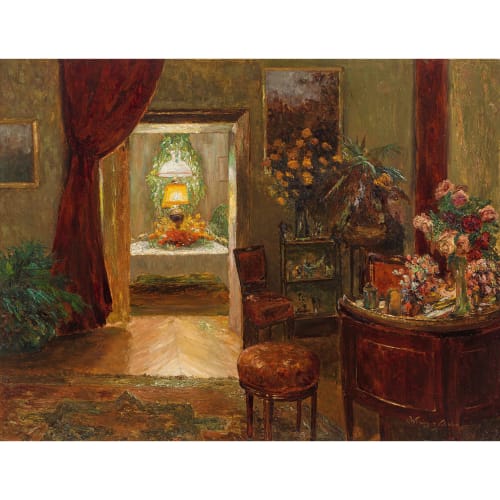Olga Wisinger-Florian was originally educated as a pianist by Julius Epstein. At almost 30 years of age, she decided to study painting under Melchior Fritsch and August Schaeffer. In 1880 she became a pupil of Emil Jakob Schindler. Her main motif was cultivated nature, especially parks, gardens and flower arrangements. In the late 1890’s she changed her focus to forest landscapes. In the late 1880’s she moved away from the style of painting she had been taught and arrived at a rich and increasingly iridescent colouring. While her perception of nature had always remained true to the poetic realism of her mentor Schindler, the ensuing decade saw a change in her artistic expression. She became increasingly influenced by the impasto technique, her colouring became ever more dynamic. Thus she was in perfect keeping with the time and even approached French Impressionism. Her artistic expression became more spontaneous and she developed a tendency for dissolving contours. By the early 1880’s the artist had already established herself at various successful international exhibitions. She contributed to the World’s Columbian Exhibition in Chicago in 1893 where she received a medal. That same year she participated in the annual exhibition of the Vienna Künstlerhaus and the Munich Glass Palace. From the 1890’s Wisinger’s works were characterised by an acute observance of the intricacies of nature, with the details of the subject becoming increasingly blurred towards the upper end of the canvas. Throughout her life, the artist dedicated herself to socio-political issues, contributed to the “Association of Writers and Artists in Vienna” that was founded in 1885 and became a delegate of the “New Austrian Peace Movement”.
Literature
M. Schwab, Olga Wisinger-Florian, Thesis, Vienna 1991; E. Futscher, Olga Wisinger-Florian, in: Exhibition-catalogue "Natürlichere Natur. Österreichische Malerei des Stimmungsrealismus", Kunsthaus Mürzzuschlag 1994; Lexica: Eisenberg, Wurzbach, Thieme-Becker, Müller-Singer, Boetticher, Bénézit, Busse Nr. 87299
